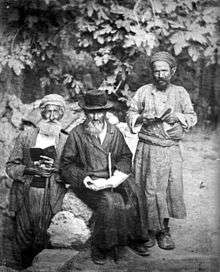1517 Hebron attacks
1517 Hebron attacks occurred in the final phases of the Ottoman–Mamluk War (1516–17), when Turkish Ottomans had ousted the Mamluks and taken Palestine. The massacre targeted the Jewish population of the city and is also referred to as a pogrom.[1]
| Old Yishuv |
|---|
 |
| Key events |
|
| Key figures |
|
| Economy |
| Philanthropy |
| Communities |
| Synagogues |
| Related articles |
Events
An account of the event, recorded by Japheth ben Manasseh in 1518, mentions how the onslaught was initiated by Turkish troops led by Murad Bey, the deputy of the Sultan from Jerusalem.[2][3] Jews were attacked, beaten and raped, and many were killed as their homes and businesses were looted and pillaged.[4] It has been suggested that the stable financial position of the Hebronite Jews at the time was what attracted the Turkish soldiers to engage in the mass plunder.[2] Others suggest the pogrom could have in fact taken place in the midst of a localised conflict, an uprising by the Arabs against the new Ottoman rulers.[5] Those who survived the calamity fled to Beirut and Jews only returned to Hebron 16 years later in 1533.[4]
See also
- 1834 Hebron massacre
- List of massacres in Ottoman Syria
References
- Spencer C. Tucker, ed. (2008). "Hebron". The Encyclopedia of the Arab-Israeli Conflict. Santa Barbara, CA: ABC-CLIO. p. 436. Retrieved May 21, 2012.
- Fred Skolnik; Michael Berenbaum (2007). Encyclopaedia Judaica. Macmillan Reference USA in association with the Keter Pub. House. p. 746. ISBN 978-0-02-865936-7.
- Jerold S. Auerbach (30 July 2009). Hebron Jews: memory and conflict in the land of Israel. Rowman & Littlefield. p. 40. ISBN 978-0-7425-6615-6.
- The Solomon Goldman lectures. Spertus College of Judaica Press. 1999. p. 56. ISBN 978-0-935982-57-2.
The Turks' conquest of the city in 1517, was marked by a violent pogrom of murder, rape, and plunder of Jewish homes. The surviving Jews fled to the "land of Beirut", not to return until 1533.
- Alan David Crown (1989). The Samaritans. Mohr Siebeck. p. 114. ISBN 978-3-16-145237-6.